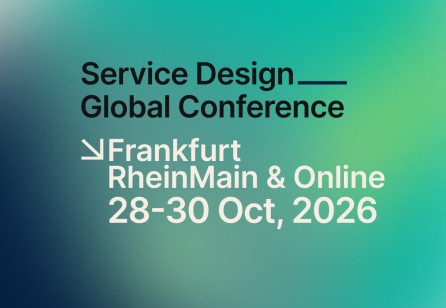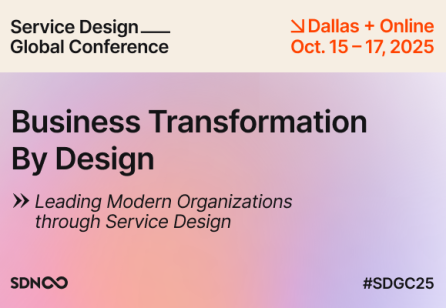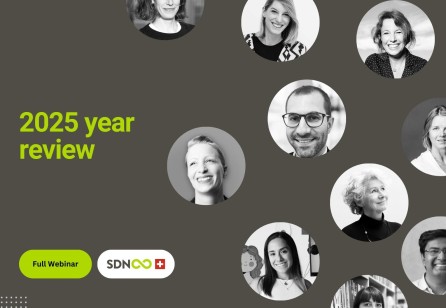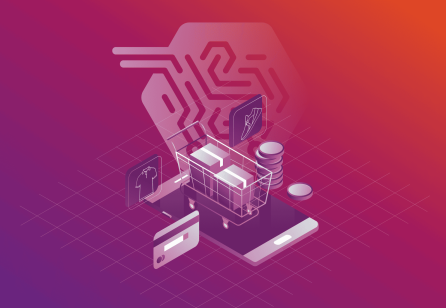Touchpoint provides a window into the discussion of service design, facilitating a forum to debate, share and advance the field and its practices. In addition, it aims at engaging clients to listen in on the discussion, learn about the field, and become involved in the developmentand implementation of service design for their organisations. The three key audiences of the publication are:
- Service design practitioners
- Client organisations including businesses, non-profits, and public sector/government
- Academia
Touchpoint 17-1 Call for Papers: “From AI to Synthetic Services”
As it has for other professions, as well as society at large, AI continues to disrupt our work as service designers, fundamentally changing the way we design, deliver and analyse services. Considering the impact on our field, and the speed of change, it made sense to revisit this as a topic in this issue of Touchpoint. However, we want to broaden our perspective beyond just AI, and look generally at how fast-moving advancements in technology are reshaping our field, and what questions and issues arise.
We have moved past the initial ‘dawn’ of AI (covered in Touchpoint Vol. 15 No. 1, in June 2024), and into a complex reality where technologies such as generative AI, robotics, sensors, intelligent systems are no longer just tools, but active agents in our service ecosystems. This shift requires us to move beyond ethics concerns and simple efficiency models towards exploring how service design can ensure these technologies augment rather than replace human capability.
In this upcoming issue, we would like to consider how new tools transform touchpoints, roles and expectations, and how designers can build trust, transparency and human agency into technologically-mediated services. At a moment when innovations are accelerating faster than organisational understanding, we are forced to ask: How do we design for co-performance where humans and machines work together? How do we ensure that as services become ‘invisible’, they remain transparent and accountable to the people they serve? And towards what goals is AI being deployed? Typical ones (such as reducing cost-to-serve and hyper-personalisation) may be frequently-cited. But what about accelerating responsible energy consumption, implementing circular economy principles and delivering nature-positive ecosystem impacts for services?
We invite case studies, frameworks and thought leadership that can guide our community towards the innovative yet responsible use of technology in the years ahead. We are particularly interested in contributions that address the accountability gap in hybrid systems and demonstrate how service design can orchestrate these complex, multi-agent environments.
Questions we would like to answer include:
Redefining roles and agency
- How do we move from designing for users and tools to designing for human-machine partnerships and hybrid teams?
- In an era of autonomous agents, how do we design trust checkpoints and ‘legible autonomy’ that allow humans to retain agency and control? How can we design for meaningful consent, control and autonomy?
- How do service designers effectively ‘orchestrate’ when stakeholders include non-human actors such as AI agents?
Trust, ethics and transparency
- How can service design ensure transparency in ambient or invisible services, where technology has faded into the background?
- Are there frameworks to help us navigate the so-called ‘accountability gap’, which may explain who (or what) is responsible when a hybrid service fails?
- How can designers make autonomy ‘legible’ so that proactive systems’ intentions and limitations are understandable to users and stakeholders?
Methods and practice
- How must our service blueprints and journey maps evolve to visualise ‘invisible’ logic, algorithmic decision-making and the behaviours of autonomous agents?
- How can we prototype AI-delivered experiences effectively without fully building the technology first?
- What new competencies and AI fluency must in-house service design teams acquire to effectively partner with engineering and data science teams?
Impact and value
- Beyond efficiency and speed, how do we measure the value of technological augmentation as it relates to service delivery, such as increased creativity, reduced cognitive load or improved worker well-being?
- How can service design support workforce transition - reskilling, role redesign and well-being - when tasks are augmented or automated?
- How can service design prevent siloed automation, in which disconnected AI initiatives fragment the overall customer experience?
- What are the unintended consequences of ‘frictionless’ automated services, and when should design intentionally reintroduce friction?
- How do we navigate the trade-offs between sustainability and technological capability?
- What new capabilities are emerging, and what is being lost?








Share your thoughts
0 RepliesPlease login to comment